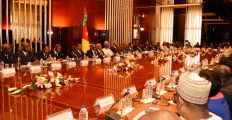7, September 2017
Al Jazeera: Linguistic tensions boil over in Cameroon 0
Thousands of students, shopkeepers and staff in Cameroon have protested this week against what they claim is the marginalisation of the country’s English-speaking minority population. The so-called ghost-town protests in the Anglophone regions of Cameroon, including the city of Bamenda in the north and the town of Buea in the southwest, which led to the closure of schools, shops and market stalls, are the latest in a series of actions launched in November 2016.
Initiated by teachers and lawyers, the protests have revolved around encouraging people to use absenteeism to challenge what many English-speaking citizens claim is the dominance of French in society. Thousands of students stayed away as schools resumed this week. Petrol stations and shops were also empty.
Many protesters called for full linguistic representation in schools, courts and in the government. Cameroon’s English-speaking citizens make up around 20 percent of the nation’s total population of almost 24 million. The rest of the country speaks French, which is the language of use for government business.
Activists in the Southwest Region of Ambazonia told Al Jazeera that a mass skipping of the first day of school – Monday, September 4 – was a success. “Some people think that parents are not sending their kids to school because of the militarisation of these two regions, but that’s not the case,” said a participant who wanted to remain anonymous.
“How do you want kids to go back to a system that we are protesting against, the system that we want cleaned? It’s a peaceful protest.” On Monday, pro-government newspapers, the Cameroon Tribune and L’essentiel du Cameroun, published front-page stories showing children attending school as normal.
Security forces were also deployed in the affected areas at the start of the week to ensure there was no repeat of last year’s violent protests which witnessed the use of live ammunition and tear gas by state security forces. Since protests began last year, the government has frequently cracked down on disorder in the Anglophone regions of the country.
President Paul Biya, in power for 35 years, ordered a series of arrests and shut down internet access for three months. Security forces have killed at least six people to date and arrested hundreds more. Last Friday, President Biya ordered the release of dozens of political activists in a move seen as an attempt to ease tensions. The UN has called for both sides to engage in constructive dialogue.
Source: Al Jazeera


























11, September 2017
Congo conflict forces more children to leave school 0
More and more children are being deprived of education in the Republic of the Congo over a protracted conflict and the country’s weak education system, an NGO says.
The Norwegian Refugee Council said Monday that some 850,000 children have been displaced and 900 schools have been destroyed as a result of intensified violence in Congo’s central Kasai region over the past year.
The group said the population is part of some 7.4 million children who are out of school in Congo as the conflict keeps taking toll on the country’s already weakened education system.
Some 92 percent of children in the six-to-11-year-old age group are out of school in the violence-hit towns of Kalemie and Tanganyika, the group said.
The group also warned that the vast Central African country risks losing its next generation as only 4 percent of humanitarian funds for education have been received this year.
“When children are displaced they are forced to suspend their education, or drop it altogether. This disruption to their development hinders their personal progress, and has detrimental effects to the socio-economics of the entire country,” said Celestin Kamori, the council’s Congo education program coordinator.
The campaigning group called on international donors to prioritize education emergencies.
“Donors should recognize that education is also a protection tool. Children enrolled in emergency education classes, catch-up classes and child-friendly spaces are less likely to join armed groups,” said Kamori, adding, “We need more funding to scale up emergency education support so that we don’t lose a generation.”
The Norwegian Refugee Council said many schools that are spared of the effects of fighting in Congo are used to shelter displaced families, further complicating efforts to restore the education system.
It added that school-aged children account for more than 17 percent of some 3.8 million people who have been displaced in Congo over the past two decades.
Source: Presstv